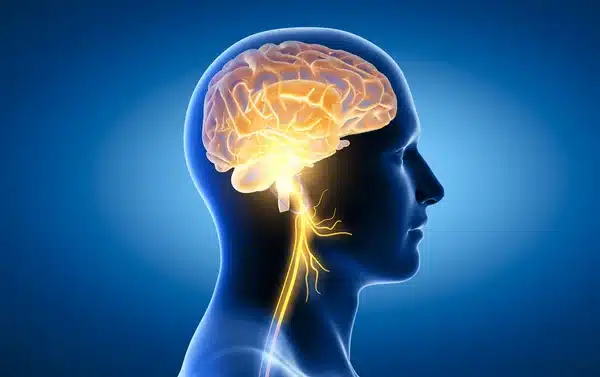The Vagus Nerve Explained
At Wellspring Counselling Inc., we are committed to offering effective, evidence-based online counselling services. An essential aspect of mental health and well-being is understanding the connection between our minds and bodies. One key player in this connection is the vagus nerve. In this blog post, we will explore the significance of the vagus nerve in counselling and mental health and provide experiential exercises to help regulate it for optimal emotional balance.
The Vagus Nerve: A Brief Overview
The vagus nerve is the longest and most complex of the 12 cranial nerves. It connects the brainstem to various body parts, including the heart, lungs, and digestive system (Breit et al., 2018). The vagus nerve plays a vital role in regulating the autonomic nervous system, which controls involuntary processes such as heart rate, digestion, and respiratory rate (Gerritsen & Band, 2018).
Importance of the Vagus Nerve in Counselling and Mental Health
The vagus nerve’s regulation of the autonomic nervous system has significant implications for mental health. Its two main branches, the sympathetic and parasympathetic nervous systems, are responsible for our “fight or flight” and “rest and digest” responses, respectively (Porges, 2007). A well-regulated vagus nerve can help maintain a balance between these two responses, which is crucial for mental health.
- Emotion Regulation: The vagus nerve is implicated in the regulation of emotions, particularly in response to stress (Porges, 2007). Proper functioning of the vagus nerve can help individuals better manage stress, decrease anxiety, and reduce the risk of developing mental health disorders (Gerritsen & Band, 2018).
- Social Engagement: The polyvagal theory, proposed by Dr. Stephen Porges, posits that the vagus nerve is involved in the social engagement system, which is responsible for our ability to form connections with others (Porges, 2007). A well-regulated vagus nerve can enhance social interaction, promote feelings of safety, and foster attachment, all of which are important in therapeutic settings (Porges, 2007).
- Resilience: A strong vagal tone, which refers to the activity of the vagus nerve, is linked to greater resilience in the face of adversity (Kok et al., 2013). This can be especially important in counselling settings, where individuals may be working through challenging life circumstances.
Regulating the Vagus Nerve: Experiential Exercises
Here are some practical, experiential exercises that you can try at home to help regulate your vagus nerve and improve your mental health:
- Diaphragmatic Breathing: Diaphragmatic breathing, also known as “belly breathing,” can stimulate the vagus nerve and promote relaxation (Zaccaro et al., 2018). To practice, find a comfortable position and place one hand on your chest and the other on your belly. Inhale deeply through your nose, allowing your belly to rise, and then exhale slowly through your mouth, letting your belly fall. Repeat this for several minutes each day.
- Humming: Humming can activate the vagus nerve by vibrating the vocal cords (Gerritsen & Band, 2018). Simply choose a comfortable pitch and hum for a few minutes each day. Experiment with different pitches and durations to find what feels best for you.
- Cold Exposure: Brief exposure to cold can stimulate the vagus nerve and promote relaxation (Makinen et al., 2008). To incorporate this into your daily routine, try ending your shower with 30 seconds to a minute of cold water. Alternatively, you can splash your face with cold water or place a cold pack on your forehead for a few minutes.
- Mindful Meditation: Practicing mindfulness can help regulate the vagus nerve by promoting relaxation and reducing stress (Matousek et al., 2010). To begin, find a quiet space and sit in a comfortable position. Close your eyes and focus on your breath, observing its natural rhythm without trying to change it. If your mind begins to wander, gently bring your attention back to your breath. Practice this for 10-20 minutes each day.
- Progressive Muscle Relaxation: This technique can help activate the vagus nerve by releasing tension in your muscles (Gerritsen & Band, 2018). Begin by lying down or sitting in a comfortable position. Starting with your feet and working your way up, tense each muscle group for 5-10 seconds, then release the tension as you exhale. Repeat this process for each muscle group until you have covered your entire body.
The vagus nerve plays a crucial role in mental health and well-being, and learning how to regulate it can have profound effects on your emotional balance, resilience, and social engagement. By incorporating the experiential exercises outlined above into your daily routine, you can work toward a healthier, more balanced mind-body connection. At Wellspring Counselling Inc., we are dedicated to supporting our clients in their journey toward improved mental health by providing evidence-based, holistic counselling services.
As you continue to work on improving your mental health and well-being, it’s important to remember that regulating the vagus nerve is just one piece of the puzzle. In addition to the experiential exercises mentioned above, consider exploring other therapeutic interventions and self-care practices, such as talk therapy, physical exercise, and maintaining a healthy diet.
At Wellspring Counselling Inc., we understand that every individual’s needs are unique, and our team of dedicated professionals is here to support you in finding the best strategies for your mental health journey. By combining a solid understanding of the vagus nerve’s role in mental health with evidence-based therapeutic techniques, we strive to help our clients achieve a balanced and fulfilling life.
Improve Your Well-Being with Online Counselling in Vancouver & BC at Wellspring Counselling Inc.
Wellspring Counselling Inc. provides accessible online counselling services in Vancouver and BC. If you or someone you know could benefit, reach out. Let’s work together to enhance mental health with our compassionate and evidence-based approach. Request a 10-Min Free Consultation for support and positive change.
References
Breit, S., Kupferberg, A., Rogler, G., & Hasler, G. (2018). Vagus nerve as modulator of the brain-gut axis in psychiatric and inflammatory disorders. Frontiers in Psychiatry, 9, 44. https://doi.org/10.3389/fpsyt.2018.00044
Gerritsen, R. J. S., & Band, G. P. H. (2018). Breath of life: The respiratory vagal stimulation model of contemplative activity. Frontiers in Human Neuroscience, 12, 397. https://doi.org/10.3389/fnhum.2018.00397
Kok, B. E., Coffey, K. A., Cohn, M. A., Catalino, L. I., Vacharkulksemsuk, T., Algoe, S. B., … & Fredrickson, B. L. (2013). How positive emotions build physical health: Perceived positive social connections account for the upward spiral between positive emotions and vagal tone. Psychological Science, 24(7), 1123-1132. https://doi.org/10.1177/0956797612470827
Makinen, T. M., Mäntysaari, M., Pääkkönen, T., Jokelainen, J., Palinkas, L. A., Hassi, J., … & Leppäluoto, J. (2008). Autonomic nervous function during whole-body cold exposure before and after cold acclimation. Aviation, Space, and Environmental Medicine, 79(9), 875-882.
Matousek, R. H., Dobkin, P. L., & Pruessner, J. (2010). Cortisol as a marker for improvement in mindfulness-based stress reduction. Complementary Therapies in Clinical Practice, 16(1), 13-19. https://doi.org/10.1016/j.ctcp.2009.06.004
Porges, S. W. (2007). The polyvagal perspective. Biological Psychology, 74(2), 116-143. https://doi.org/10.1016/j.biopsycho.2006.06.009
Zaccaro, A., Piarulli, A., Laurino, M., Garbella, E., Menicucci, D., Neri, B., & Gemignani, A. (2018). How breath-control can change your life: A systematic review on psycho-physiological correlates of slow breathing. Frontiers in Human Neuroscience, 12, 353. https://doi.org/10.3389/fnhum.2018.00353





